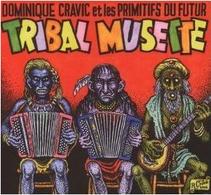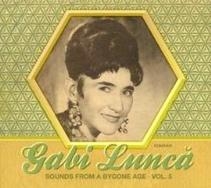A Consumer Guide to the Trailing Edge: June, 2008
Recycled Goods (#54)
by Tom Hull
 |
 |
Spent the month trying to keep up with the flood of Jazz Consumer Guide entrants, some of which proved ancient enough to fall through to here. Slipped in a couple of world music delights to encourage publicists to keep sending. Besides, I liked their covers, although it took a while to track down scans, and I had to hack on them a bit to make them fit. Record count is up from the last two months when this column went into semi-retirement. Next month could just as easily go down, especially since I've run out of old jazz.
The Peter Brötzmann Octet: The Complete Machine Gun Sessions (1968 [2007], Atavistic): Roughly speaking, this is where Europe's jazz avant-garde takes off, building a tradition rooted in brutal cacophony, disjointed rhythm, and cartoonish irreverance. The three saxophonists went on to major careers: Evan Parker, Willem Breuker, and Brötzmann. They turn these long pieces into free fire zones, blaring in unison siren wails, splitting off to scratch through the dirt and the rubble. Two bassists: Peter Kowald and Buschi Niebergall. Two drummers: Han Bennink and Sven-Ake Johansson. One pianist: Fred Van Hove. Each has his own mind, but the piano is especially worth tracking. Original LP ran 37:08. CD reissue added two alternate takes, and now this edition adds a third take of the title piece, done live with extra saxophonist Gerd Dudek. Still fits on one CD, but it's an awful lot to sit through. B+
Classic Piano Blues From Smithsonian Folkways (1944-76 [2008], Smithsonian/Folkways): The small print limits the selection to Moe Asch's folkie-ethnomusicological label, which recorded some 3000 LPs with its eyes and ears fixed on the past -- one result is that real classics like Leroy Carr are too old, and contemporaries like Otis Spann are too modern. Sampled instead are such uncommercial fogeys as Memphis Slim, Speckled Red, Roosevelt Sykes, Champion Jack Dupree, and Little Brother Montgomery, with James P. Johnson a surprise appearance. The booklet often omits recording dates -- 1944-76 covers about half of the songs, but others could be earlier or later -- but otherwise provides a lot of information, often referencing more classic versions of these same songs. B+
Dominique Cravic et les Primitifs du Futur: Tribal Musette (2007-08 [2008], Sunnyside): It's tempting to view this French cabaret group through the prism of their famous cover illustrator and sometime mandoline player, R. Crumb. Like the Cheap Suit Serenaders, guitarist Cravic's band is firmly planted in the past, its embrace of primtivism rooted in the romantic view of anthropology, with a little sci-fi for the future. For me it works not for its longing for other times so much as how disarmingly and charmingly French it all sounds: the accordions, marimba, clarinets, "musicale saw," "finger snapping," rhythm guitar, voices ranging from cigarette-stained poetasting to sweet chorales. Where we tend to think of world music as anything-but-ours, in France the view seems to be everything-including-ours. A-
Gabi Lunca: Sounds From a Bygone Age, Vol. 5 (1956-78 [2008], Asphalt Tango): Even now, nobody would go so far as to claim that Ceausescu's Romania harbored a golden age of pop music, but the German label Asphalt Tango has compiled five volumes without a slip, music no one else seems to have had a clue about. (Buda Musique's Éthiopiques series has done something comparable, but is more hit and miss.) Gypsy lautari music, with accordion and violin and cimbalom, mostly consumed at weddings, only rarely recorded. Lunca was the more refined of two major female singers -- the earthier Romica Puceanu got her props back on Vol. 2. A-
Briefly Noted
Nat Adderley: Work Song (1960 [2008], Riverside/Keepnews Collection): Cannonball's little brother plays a lean, unpolished cornet, backed by a group that straddles Bobby Timmons' funk-groove piano and Wes Montgomery's slickened blues guitar; the irresistibly catchy title cut makes this a minor hard bop classic. A-
Albert Ayler/Don Cherry/John Tchicai/Roswell Rudd/Gary Peacock/Sunny Murray: New York Eye and Ear Control (1964 [2008], ESP-Disk): Ayler's record, but all names are on the cover and all are notable, the four horns churning tumultuously, with Ayler's tenor sax reaching for the sacred, and Rudd's trombone plumbing the profane. B+
Don Cherry: Life at Café Montmartre 1966: Volume Two (1966 [2008], ESP-Disk): Sloppy seconds in Copenhagen, with Gato Barbieri's tenor sax sparring with the leader's trumpet over the fractured field of Karl Berger vibes, playing such complex Cherry compositions as "Complete Communion" loose and short-handed. B
Ornette Coleman: Town Hall, 1962 (1962 [2008], ESP-Disk): Three cuts with the trio that in 1965 cut At the Golden Circle, Stockholm, both volumes highly recommended, this less essential but unmistakable; sandwiched in the middle is a 9:17 string quartet, Coleman's first recorded glimpse of his harmolodic chamber music, something else again. B+
Droppin' Science: Greatest Samples From the Blue Note Lab (1966-74 [2008], Blue Note): With Alfred Lion and Francis Wolf departing, the legendary label foundered, adrift in quasi-commercial soul jazz with languid beats that I suppose have been sampled from time to time -- no details here, just another attempt to turn sows' ears into silk purses. C+
Coleman Hawkins: The Hawk Flies High (1957 [2008], Riverside/Keepnews Collection): Makes it look easy, too, lifted by warm brass from Idrees Suleiman and J.J. Johnson, soaring over a rhythm section that layers Hank Jones bebop on Jo Jones swing, swooping and diving and snatching the listener's attention with surprisingly effortless grace; only complaint is sometimes Hawk makes it look too easy. A-
Frank Lowe: Black Beings (1973 [2008], ESP-Disk): The short middle piece is solo tenor sax, thoughtful and intriguing; the two long pieces sandwiched around the solo are screamers, with Joseph Jarman on second noisemaker, wailing and shrieking spastically around Lowe's meatier riffs. B-
Chris McGregor's Brotherhood of Breath: Eclipse at Dawn (1971 [2008], Cuneiform): A band of South African exiles with their township jive melodies, doubled to big band strength with English avant-gardists, the sounds repressed by apartheid amplified into the cacophonous noise of freedom; a live set from Berlin, not the clearest or the most exhilarating of performances, but a remarkable band. B+
Wes Montgomery: Incredible Jazz Guitar (1960 [2008], Riverside/Keepnews Collection): Not really -- despite his overwhelming influence on two-thirds of the jazz guitarists who followed in his wake, at best he was a subtle craftsman with natural swing on basic blues; nowhere is that more clear than on this elegant quartet with Tommy Flanagan's piano as delectable as the guitar. A-
Art Pepper: Unreleased Art, Vol. III: The Croydon Concert, May 14, 1981 (1981 [2008], Widow's Taste, 2CD): A hot set with a group -- Milcho Leviev on piano, Bob Magnuson on bass, Carl Burnett on drums -- Pepper toured often but recorded rarely with; he calls them his favorite group, and they repay the compliment -- there seems to be no end to wondrous tapes from his last years. A-
Sonny Rollins: Freedom Suite (1958 [2008], Riverside/Keepnews Collection): The 19:37 title cut seems a little subdued, tentative as if freedom is still uncertain; same for the side of standards, expanded with redundant bonus cuts, but they're just tapping into his sentimental side. B+
McCoy Tyner: Fly With the Wind (1976 [2008], Milestone/Keepnews Collection): A symphony of sorts, tempestuous but wildly scattered including some of those dull atmospheric spots, performed by a massive string orchestra plus harp, wind instruments limited to oboe and flutes, a rhythm section with Ron Carter and Billy Cobham frantically struggling to keep up with the pianist. B
James Zitro: Zitro (1967 [2008], ESP-Disk): Percussionist, worked with Sonny Simmons, got a free shot on the label that bragged "the artist alone decide" and turned out an energetic but unexceptional free jazz blast, a sextet with Alan Praskin and Bert Wilson on noisy saxes and Warren Gale riffing high on trumpet. B
Additional Consumer News
Notes
Copyright © 2008 Tom Hull.